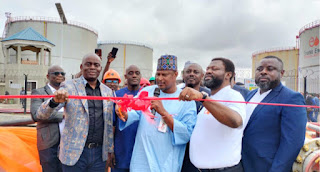This makes them the first private company to do so in a post-subsidy system.
The CEO of Emadeb, Adebowale Olujimi, speaking at the company's wharf in Lagos on Wednesday, said the product arrived as a commodity valued at over $17 million.
Before the development, the Nigerian National Petroleum Company (NNPC) Limited was the only importer of gasoline in the country.
Olujimi explained that the decision to import the goods stemmed from the need to strategically position the company to take advantage of the opportunities offered by the new marketing system. "The value of this cargo here, as such, cannot be found on the market. That is more than $17 million and there is no way you can beat what FX is now. So far, we have imported 27 million liters of PMS, but local processing is the way forward for us in this country," he said.
We want to be one of the first players in this game. Together with some of our business partners, we decided to get the licenses and this has brought us here today. - Importing petrol is not a sustainable way of working for the country. What we saw yesterday when the price of PMS rose above N600 per liter shows that the dynamics of business are difficult. Importing it requires huge US dollars. The way forward is to revive local refineries,” he said.
Farouk Ahmed, CEO of NMDPRA, said the development was significant as the manufacturing industry was deregulated. Ahmed, who was represented by NMDPRA's Director of Business Services and Management, Sadiq Bashir, said Emadeb has demonstrated a business model that can be successfully implemented in the country.
"The point of this is that deregulation has been adopted and the removal of subsidies is a thing of the past. It also showed that by working together as industry stakeholders, we can indeed diversify the supply of a very important source of energy for this country," he said.
"Really, regulation is not just about pricing, it's about opening up the market and what we do at NMDPRA is make sure we ensure supply by licensing people to import the product where needed or, if we license downstream processors, we make sure that product is made in the country."









No comments:
Post a Comment
DISCLAIMER
Opinions expressed in comments by readers, do not reflect the views of THEWATCHNGR and the THEWATCH NEWS Media or any employee thereof.